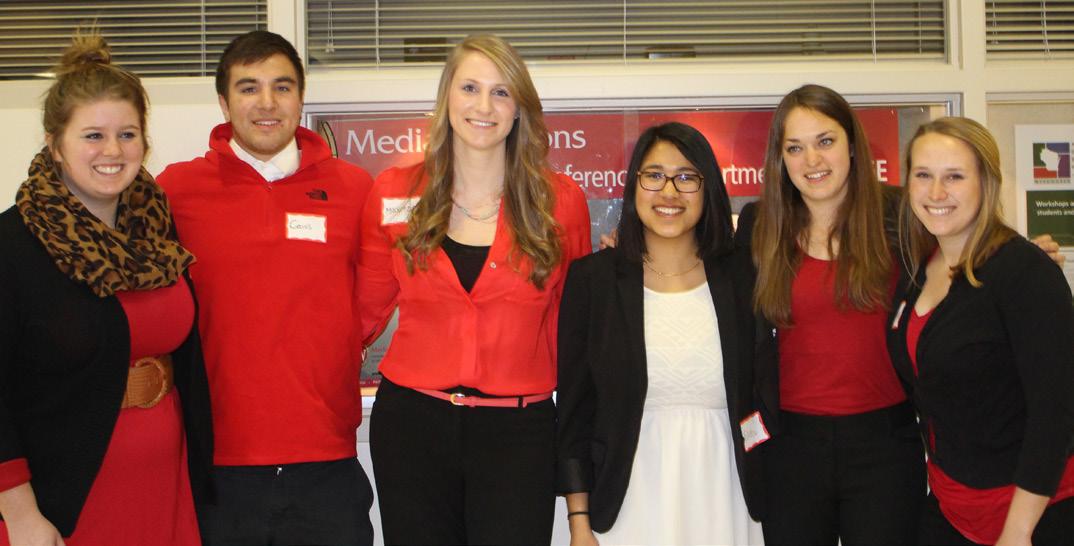
2 minute read
Engaging world scholars
Visiting Scholar Awards Partnership eases migrants’ lives
Picking up your whole life and moving is hard. Despite the challenges, Mexican men and women migrate to work in the United States and later return home, changing themselves, their families and communities.
Professor Maria de la Luz Perez-Padilla, a GHI visiting scholar from Universidad de Guadalajara, spent a semester working with UW-Madison Professor Lynet Uttal exploring how to ease the transition from Mexico to the United States and back again. “It’s an amazing thing when you can find an intellectual buddy,” Uttal said. “Researchers are so specialized. There may be only two to three people in the world who study the same thing.”
“Two strains come together, and we are able to work so much more productively.” — Maria de la Luz Perez-Padilla
Perez-Padilla described the partnership as two rivers combining into one large, powerful river that can lead to many different places. She was one of a cohort of GHI visiting scholars from Colombia, Ethiopia, Sri Lanka, Mexico and Zambia who visited campus in 2013-2014.
Read more.
Quality improvement International fellows practice leadership
During the August 2013 GHI Quality Improvement Institute, participants led by Lori DiPrete Brown, GHI associate director for Education and Engagement, worked with students, faculty and staff from UW-Madison, UW Hospitals and Clinics and UW Medical Foundation as they developed plans to tackle health challenges.
The process began with a single question: What do you want to change? Fellows’ plans included using room heaters to reduce hypothermia among Ethiopian newborns and improving life skills to reduce teenage pregnancies in The Gambia. The QI Institute also gave UW-Madison students a context for information they learned in the classroom and an opportunity to engage with the visitors as partners and learners.
Read more.
By the numbers:
$47,324 awarded to support six visiting scholars who collaborated with UW-Madison colleagues in four schools and colleges.
Above: Global health fellows and project representatives from Africa and eastern Asia developed plans to reduce unwanted pregnancies, improve health care and save lives during the third annual GHI Quality Improvement Institute in August 2013.
By the numbers:
$34,715 in Graduate Fellowship Awards to seven graduate researchers in the Schools of Pharmacy, Veterinary Medicine and Medicine and Public Health, and the College of Letters & Science.
Investing in the future
Graduate Research Awards
Fellows pursue ‘one health’
GHI’s Graduate Research Awards helped seven students tackle health challenges, from the spread of dengue fever in Colombia to the impact of health care changes in the highlands of Thailand. Students represented academic programs in Pharmacy, Veterinary Medicine, Journalism & Mass Communication, Letters & Science, Medicine and Public Health, and the Nelson Institute for Environmental Studies. Their work furthers the concept of One Health, an integrated approach to well-being for humans, animals and the environment.
Ephrem Aboneh, graduate student in Social and Administrative Sciences, School of Pharmacy, looked at medical safety in Ethiopia, his homeland.

“I am hoping to use this as an opportunity to jump-start discussion in the area as well as broaden future work,” he said.
“I have found that hospitals in the United States have successfully implemented strategies that may be leveraged to support patient safety in hospitals in developing countries.”
Ephrem Aboneh
Stephanie Koning, doctoral student in the Department of Population Health, School of Medicine and Public Health, studied how Thailand’s rural health care expansion impacted maternal and infant mortality. “We need to see the broader impacts of health system reform and the protection of human rights through health promotion,” she said.
“This research has important implications for global health research and utilizes an interdisciplinary approach to study the social and political motivations behind changing health behaviors.”
— Stephanie Koning
Read
more.






